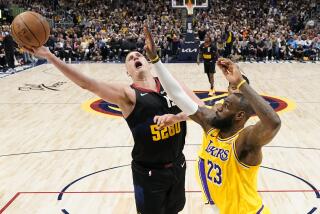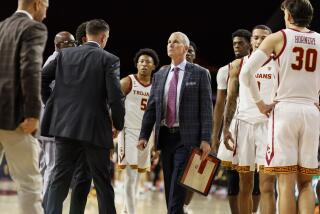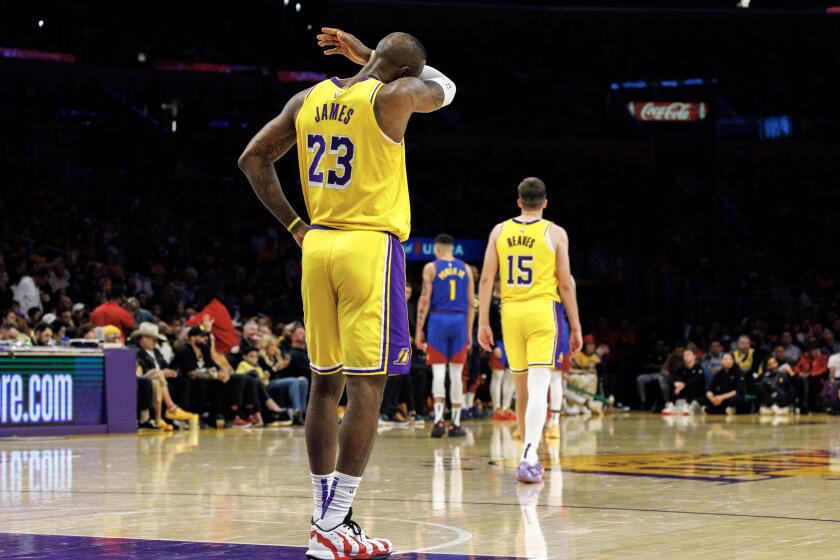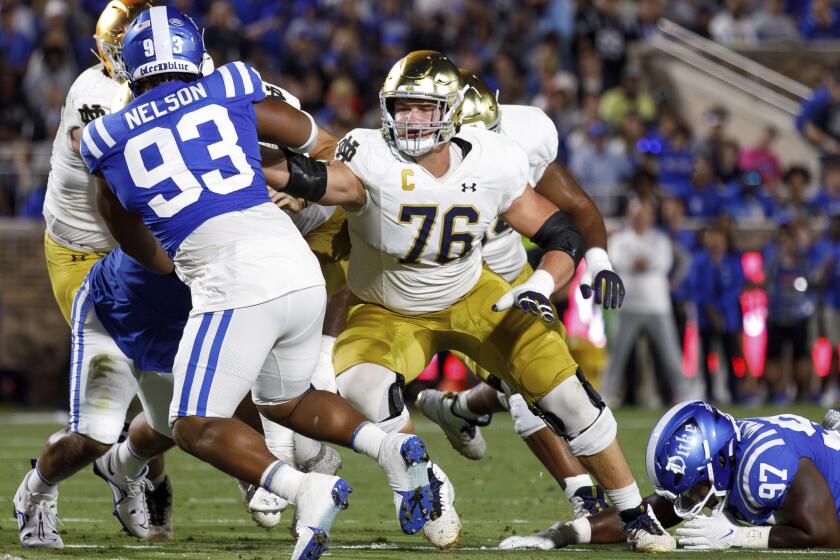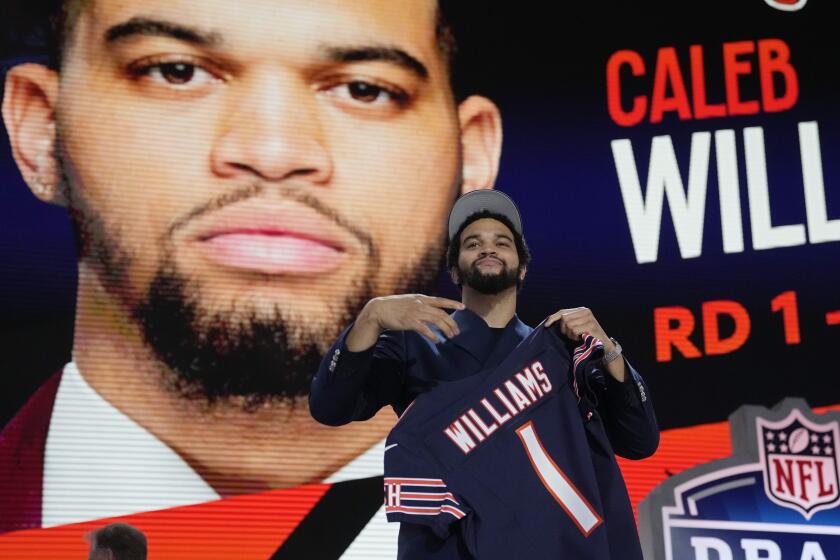Outcries against controversial sports calls can lead to rules changes
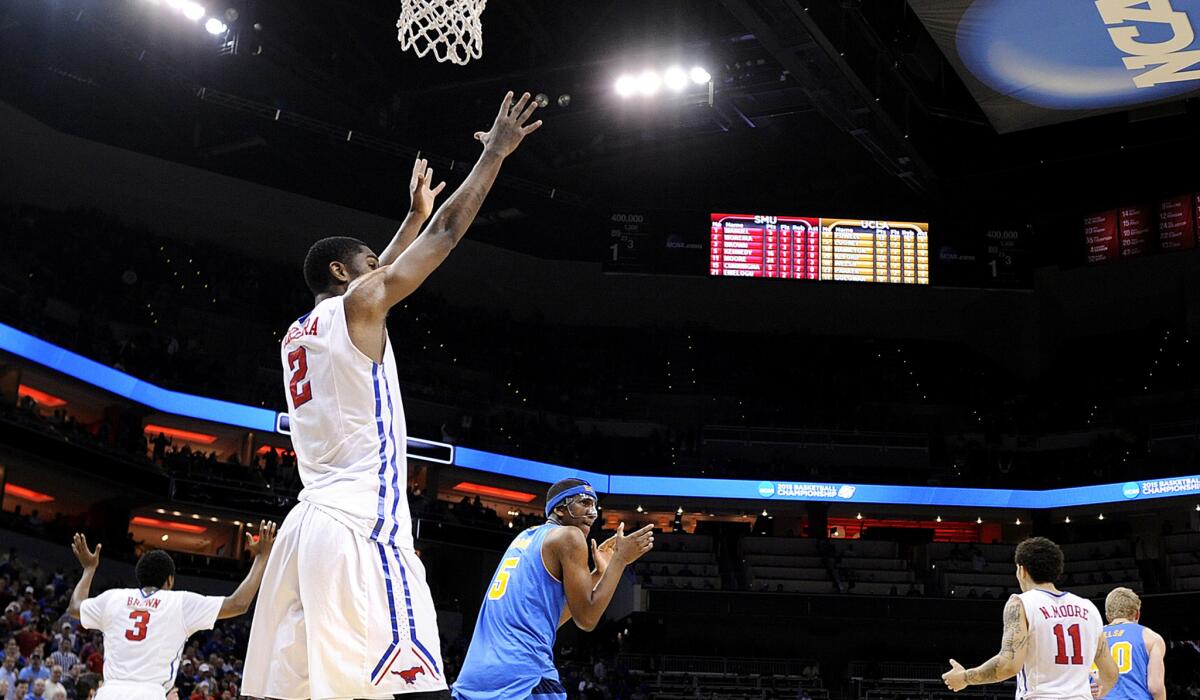
Whether you agreed with it, Southern Methodist Coach Larry Brown raised an interesting point about the goaltending call that gave UCLA a one-point win over his team Thursday.
The veteran coach didn’t complain about the decision itself. His beef was that while parts of the determining play were reviewable using instant replay, the most important aspect was not.
Game officials checked whether UCLA guard Bryce Alford was behind the three-point line when he launched the ball. But whether SMU forward Yanick Moreira touched it, whether it was over or on the rim — and whether the shot had a chance to go in — was not, by rule, allowed an additional look.
“Why would you have all these TV people and [not] take five seconds and review a goaltending?” Brown asked.
Art Hyland, secretary-rules editor for the NCAA men’s basketball rules committee, said Friday that changes would be considered during May meetings.
“In the past, interest in specific rules changes has often been generated by high profile situations which have occurred in the NCAA tournament,” Hyland said in an email. “Based on the interest in the recent goaltending call in the UCLA-SMU game, I would expect that the committee would want to reexamine the Instant Replay rule to see if goaltending and/or basket interference or any other judgment calls should be included in the list of reviewable plays.”
Sports has the technology to get the calls right. It just doesn’t always use it.
The same play in an NBA game would have received an additional look because goaltending/basket interference is among 15 situations that are reviewable through the NBA Replay Center.
The league requires “clear and conclusive” visual evidence to overturn officials’ calls — which just makes it a different kind of judgment call.
Last spring, for example, in Game 5 of the Clippers’ playoff series against the Oklahoma City Thunder, a ball appeared to go off the body of a Thunder player on an out-of-bounds play. A replay of the action showed the Thunder player touching the ball last, but it also captured a foul on the Clippers’ Matt Barnes that had not been called. The foul in the play was not reviewable, but Coach Doc Rivers argued it was taken into consideration anyway when officials ruled video on the touch was not conclusive enough to change their call.
In the NFL, last season’s win by Dallas over Detroit in a wild-card game was tainted when a pass interference call on the Cowboys during the fourth quarter was waved off by the game officials. A flag was thrown, but officials picked it up and announced there was no foul.
The call would have given the Lions a first down. Instead, the Cowboys got the ball back and went on to win, 24-20.
The league’s competition committee probably will take a look at that situation and others when it meets next week.
Major League Baseball does not allow instant replay for judgment calls on balls and strikes, obstruction, interference, infield-fly calls and check swings.
It didn’t used to apply review to calls at the bases, either, until after a 2010 game in which Detroit Tigers pitcher Armando Galarraga lost a perfect game when
umpire Jim Joyce mistakenly ruled a runner safe at first base on what would have been the final out.
Last season, baseball adopted instant replay for ground-rule doubles, fan-interference calls, boundary calls, force plays at all bases, tag plays on the base paths, catch/trap calls on balls hit into the outfield, time plays — such as whether a run scored before the third out — whether a runner passed a preceding runner, and scorekeeping issues, including the count, number of outs, score or substitutions.
Soccer does not use video replays, but missed calls are frequently replayed in slow motion to viewers all over the world.
FIFA President Sepp Blatter has long resisted giving game officials technological help, but for the first time his board of directors is considering the use of video replay on a trial basis. Plans discussed last month called for a video assistant watching on television to communicate with the referee via a headset. The only calls considered reviewable would be penalties, fouls before goals and red cards.
“I believe we will look back in 20 years’ time and say, ‘Wasn’t it quaint that we didn’t use the available technology to help referees?’” Greg Dyke, chairman of the English Football Assn. told reporters. “I think the referees themselves are now up for trying it out somewhere.”
Tennis adopted replay technology in 2006, but that failed to head off an incident at the 2009 U.S. Open when defending champion Serena Williams was charged with a point penalty on match point after yelling at a line judge for calling a foot fault on her previous serve.
The nonreviewable ruling gave Kim Clijsters a 6-4, 7-5 victory in their semifinal match.
The NHL this season corrected at least one embarrassing review loophole that arose in a Detroit Red Wings victory over the Kings last year.
In a January game at Detroit, Red Wings defenseman Niklas Kronwall was credited with a goal after his shot went off the protective netting above the glass, and the puck then bounced off the back of Kings goalie Jonathan Quick to tie the score with 26.1 seconds remaining.
The play was not reviewable because rules did not allow for video review on plays in which the puck goes out of bounds. But the outcry and embarrassment helped lead to a tweaking of the rules put into effect for this season.
The Kings eventually lost the game, and a point in the standings. But the season turned out well. They won the Stanley Cup.
SMU’s season is over.
Twitter: @latimesklein
Times staff writers Kevin Baxter, Zach Helfand, Ben Bolch, Sam Farmer, Bill Shaikin, Lisa Dillman and Bill Dwyre contributed to this report.
More to Read
Get our high school sports newsletter
Prep Rally is devoted to the SoCal high school sports experience, bringing you scores, stories and a behind-the-scenes look at what makes prep sports so popular.
You may occasionally receive promotional content from the Los Angeles Times.

